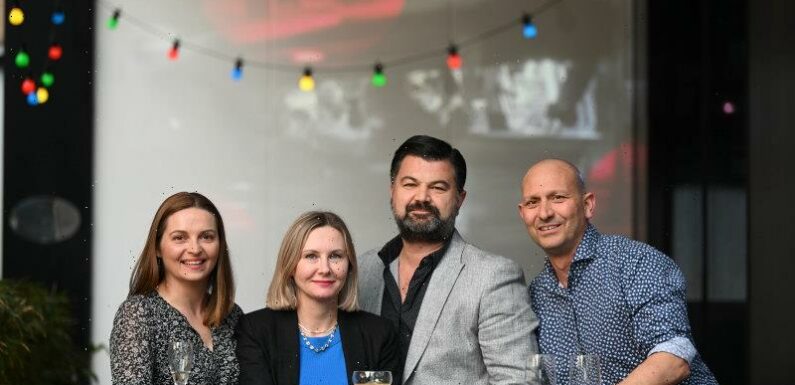
Melbourne’s busy Bourke Street mall teemed with people rushing between shops and hopping on and off packed trams.
Only a few wore masks, but many were concerned about the national cabinet decision to scrap the COVID-19 isolation period.
Prime Minister Anthony Albanese announced on Friday after a meeting with state and territory leaders that those who tested positive for the virus would no longer be forced to isolate from October 14.
Isolation payments would also end, except for casual workers in high-risk settings such as hospitals and aged care.
But David and Anne Schmitt were concerned about the move because the couple were both considered to be in the high-risk.
The couple, visiting Melbourne from Warragul, and said they still wore masks when shopping or on public transport, despite those mandates being scrapped.
The move to scrap the isolation period was blasé, Mr Schmitt said.
“It’s treating the virus as a joke, and it shouldn’t be treated as a joke,” he told The Age.
Anne and David Schmitt speak about the decision to scrap the Covid-19 isolation period in Australia. Credit:Eddie Jim
He didn’t support NSW Premier Dominic Perrottet’s push to end isolation and also slammed the decision to end payments.
“The pandemic isn’t over,” he said.
His wife Anne, who works in the medical sector, said she was pleased those in her field would still have to isolate if sick but was concerned about other people who wouldn’t, or couldn’t, stay at home when unwell.
She hadn’t had the virus but has had four jabs. She said she was still concerned about the risks she faced if the isolation period was cut.
Another person who expressed concern about the move was Melbourne dad George Thomas.
He and his wife had their three children in tow on Friday, and he said the family had so far been lucky to avoid the virus.
“I think you might be interacting with people who might have COVID, and they’ve just chosen not to isolate and so are obviously infecting others,” he said.
“It’d be sad if I had interactions with someone who was positive, and they weren’t isolating.”
George Thomas was concerned about his family catching Covid. Credit:Eddie Jim
He was particularly concerned about how it could impact his family if his children brought it back from school because there was no requirement to isolate.
“We’ve got grandparents that are quite elderly and have issues that could be made worse by COVID.”
Northcote woman Eve Urban said the rules had become “very confusing” and it was hard to know what sources to trust for information.
“I have very mixed feelings about it,” she said about ending the isolation period.
She listened to former ATAGI co-chair Allan Cheng who she said was “very trustworthy” and was not a fan of scrapping the isolation period.
“I used to work in a place where they had so many off work [because of COVID], and it’s really difficult, so I get that difficulty, but I don’t think we’ve quite got a handle on COVID yet,” she said.
Sunshine Coast couple Julie and Kerry Bowd are spending six weeks in Melbourne but had the virus a few months ago, and were wary about people unknowingly spreading it.
Ross Valerkou, Ash Simpson, Jo Simpson and Silka Valerkou were split on whether scrapping mandatory isolation and COVID payments was the right call.Credit:Eddie Jim
Out enjoying Friday night drinks at Southbank, Ross Valerkou, 48, was a bit more relaxed. He said he thought the time was right to begin treating COVID-19 like any other disease, and he wanted the government to begin saving money by ending the pandemic leave payments.
“It’s almost gone now. It’s time to get over it,” he said. “It’s a very expensive exercise for an issue that has almost gone away.”
However, Silka Valerkou and Jo Simpson – who both work in the education sector – were keen for the mandatory isolation period to remain to slow the spread of COVID-19.
“There’s still vulnerable people. We’re not all iron men like you!” Silka said to Ross.
The business world appeared to be less hesitant. Victorian Chamber of Commerce and Industry chief executive Paul Guerra welcomed national cabinet’s decision.
“It’s great news for everybody in Australia. It’s great news for businesses,” he said.
“Ultimately, now we get to join with the rest of the world and wave COVID goodbye.”
“It means now we can take matters into our own hands. If we are not feeling well we stay home. Otherwise, it’s get on with it and let’s grow Australia again.”
The national view was similar, with corporate Australia welcoming the change in policy on Friday.
Industry groups argued that mandatory isolation contributed to severe worker shortages across the country.
“The ultimate goal has always been for Covid to be treated just like any other virus and that people should be responsible for their own health – if you’re sick, stay at home, but if you’re well, you should be free to go about your business,” Australian Retailers Association chief executive Paul Zahra said.
Australian Chamber of Commerce and Industry boss Andrew McKellar said the decision marked a turning point for Australia but acknowledged businesses will have to stay vigilant against the virus.
“Employers should recognise the greater responsibility, if we do see an uptick in case numbers. A surge in staff absenteeism cannot be afforded when labour shortages are already so acute,” he said.
Business Council of Australia boss Jennifer Westacott said Australia had to “move with the rest of the world” with management of the virus.
“Australians want to get on with their lives and that means taking personal responsibility for their health decisions,” she said.
The Morning Edition newsletter is our guide to the day’s most important and interesting stories, analysis and insights. Sign up here.
Most Viewed in National
From our partners
Source: Read Full Article


